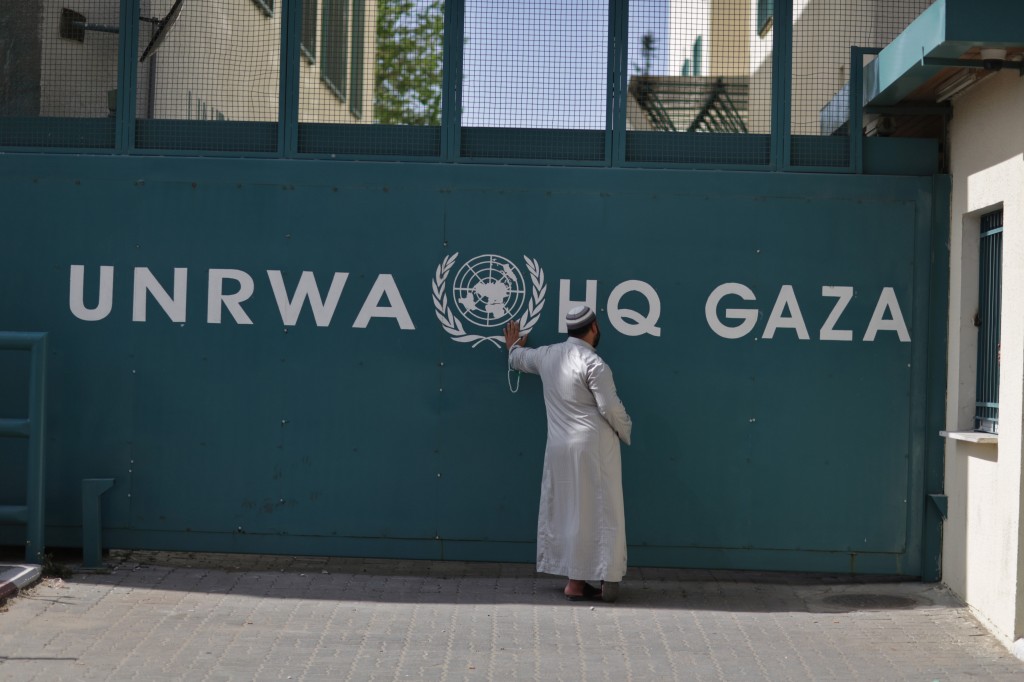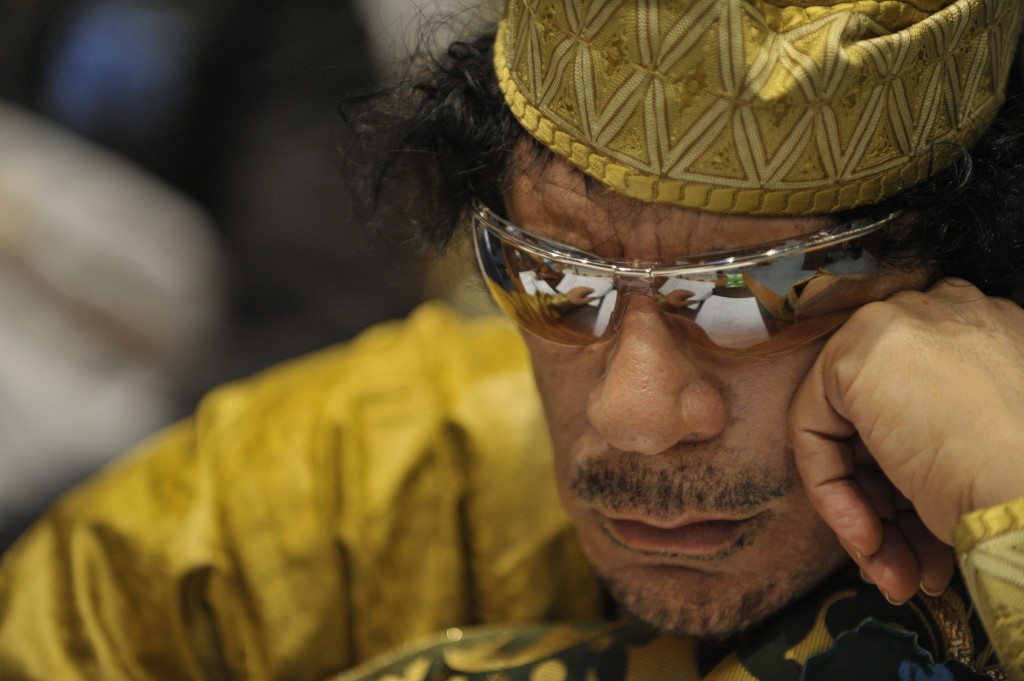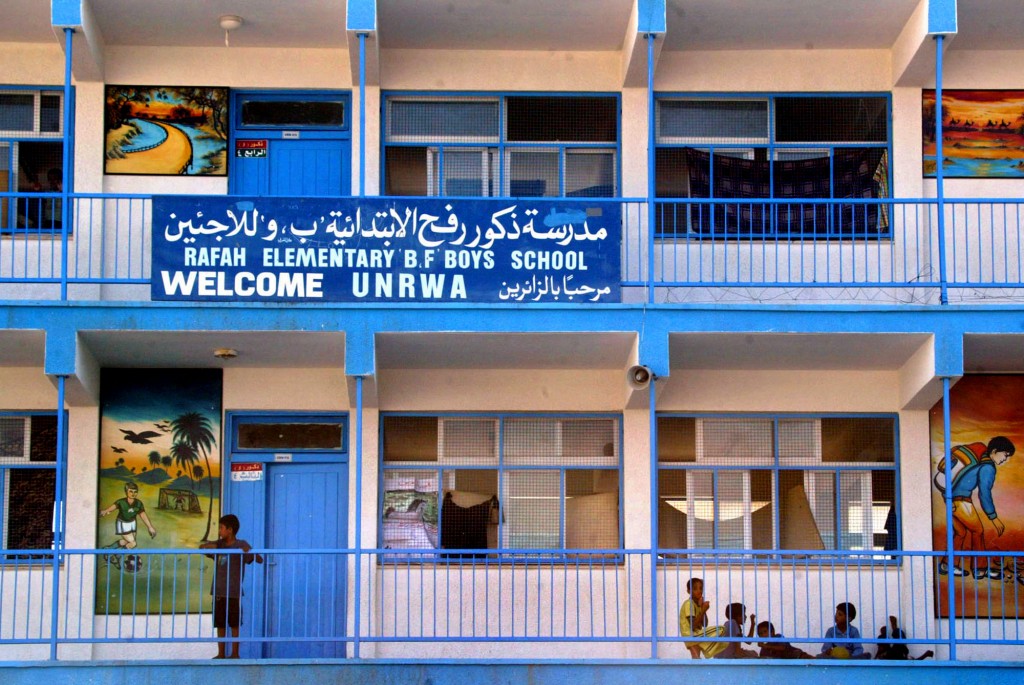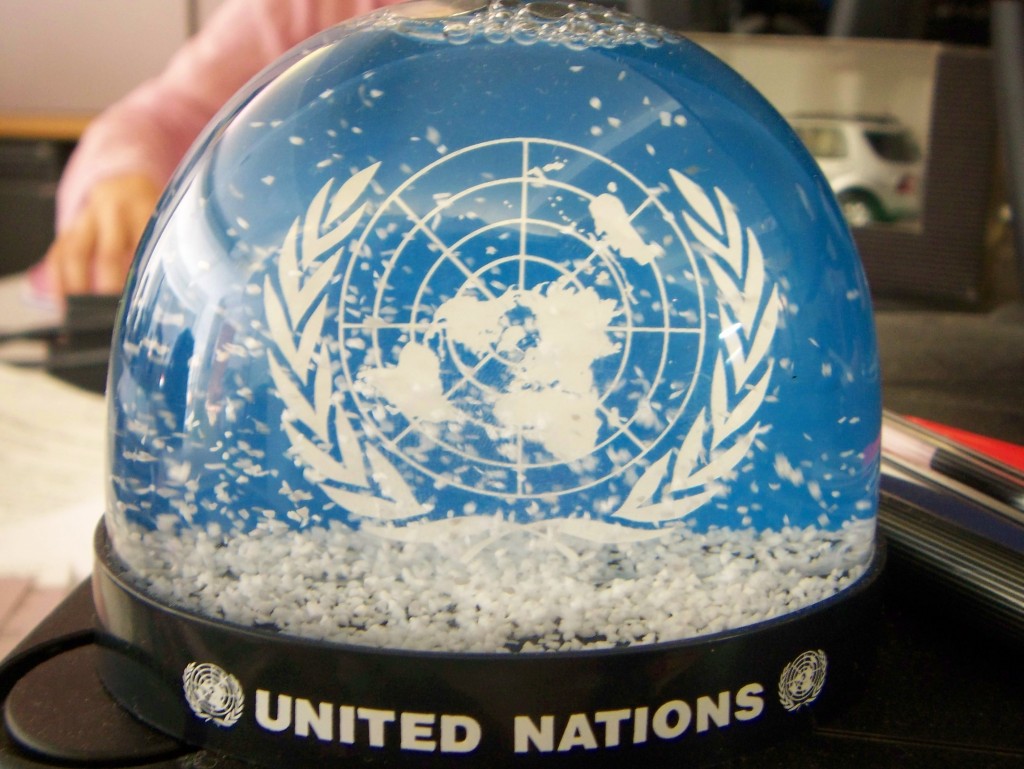Because of its arcane complexity and multiple missions, it might be the most misunderstood organization on Earth. A fresh look reveals two sharply different UNs—one ghastly, and one that could, some day, make us proud.
When United Nations Secretary-General Ban Ki-Moon visited Jerusalem this August, he made a remarkable confession to a group of students. Describing the UN’s treatment of Israel, Ban reportedly said, “Unfortunately, because of the conflict, Israel has been weighed down by criticism and suffered from bias—sometimes even discrimination.”
It’s hard to recall another senior UN official, let alone a Secretary-General, being so candid about the Jewish state’s unhappy experience of virulent criticism, endemic bias, and structured discrimination at the international organization. In fact, Ban may have been a bit too frank for a man in his position. After he returned to New York, an Israeli reporter quizzed him over his admission. Ban responded with an awkward about-turn.
“I don’t think there is discrimination against Israel at the United Nations,” Ban said. His meaning was clear enough, but his subsequent explanation blurred the distinction between is and ought in a rather intriguing manner. “The Israeli government maybe raised this issue that there’s some bias against Israel, but Israel is one of the 193 member states,” Ban continued. “Thus, Israel should have equal rights and opportunities without having any bias, any discrimination. That’s a fundamental principle of the United Nations charter. And thus, Israel should be fully given such rights” (my emphasis).
As a description of how the UN is supposed to work, Ban’s statement was perfectly correct. Article 2.1 of the UN Charter makes it clear that the organization is “based on the principle of the sovereign equality of all its members.” Once a state is accepted by the UN, its domestic form of government should have no bearing on the rights it enjoys. Indeed, the sovereignty principle is what allows states with radically different characters, from democratic Canada to totalitarian North Korea, to sit together as equal members of the organization.
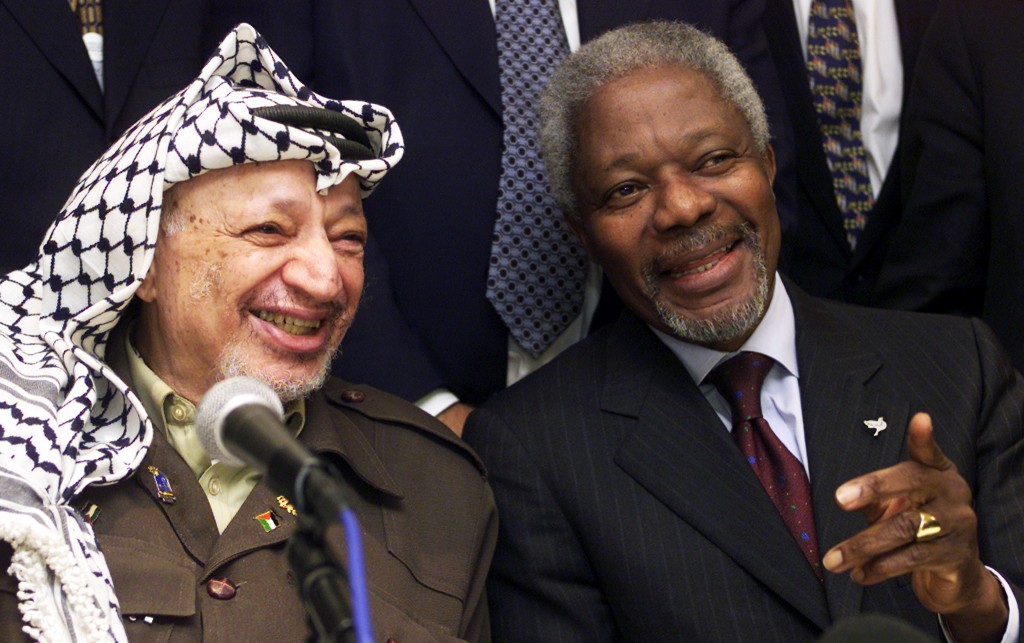
The lines between the UN and the Palestinian cause have often blurred. Photo: World Economic Forum / flickr
As an account of how the UN actually treats Israel, however, Ban’s comment was misleading to the point of frightening absurdity. While a reading of the Charter confirms that, as Ban put it, Israel “should have equal rights and opportunities,” any systematic review of Israel’s history at the international body reveals a unique pattern of discrimination. As Ron Prosor, the Israeli Ambassador to the UN, pointed out in a response to Ban’s backtracking, “It doesn’t take the investigative skills of Agatha Christie to deduce that there’s bias against Israel at the United Nations.”
Prosor provided a summary of how this discrimination manifests itself: Each year, he said, the United Nations General Assembly passes at least twenty resolutions that single out Israel. These, Prosor added, “are passed in a ‘standard operating procedure,’ discriminating against Israel with absolutely zero connection to changing realities in the world or the Middle East.” Additionally, there is the notorious “Agenda Item 7” of the UN Human Rights Council. In 2007, 46 out of 47 members of the Council agreed that Israel is the only country in the world whose alleged human rights violations should be a permanent subject of its deliberations. Year after year, the Council consistently adopts more resolutions critical of Israel than of all other countries on earth combined–including 6 in its recent March session, as opposed to 4 for the rest of the world. As Irwin Cotler, a former Canadian Minister of Justice and expert on international law, recently called upon the UN to end the Council’s extreme bias. “It is not that Israel seeks to be above the law, but that Israel is systematically denied equality before the law in the international arena; it is not that human rights standards must not be applied to Israel, but that they must apply equally.”
To students of the UN and Israel, none of this is new. But it is worth keeping in mind that the UN is not defined solely by its relationship with Israel. What is most confusing to well-intentioned outside observers is the fact that alongside its tragic record of ignoring global atrocities in order to single out the Jewish State, it has other parts of it that often seem to function more or less according to their official promise. There are, in other words, two UNs: One is the international humanitarian body that, for all its flaws, nonetheless does a great deal of good. The second, which includes an array of agencies and official and semi-official bodies, is essentially a rabidly hostile, anti-Israel manifestation of the Palestinian national movement. Taxpayers from UN member states—especially the U.S., which provides 22 percent of the UN’s budget—and anyone who is affected by what amounts to the effective hijacking of important international bodies for one-sided and sometimes violent political ends have a right to question the wisdom of continuing to support the latter, while giving the former all the credit and support it deserves.
In December 1991, the General Assembly’s most notorious resolution was voided by its shortest. Resolution 3379, which declared Zionism a form of racism, was revoked by a single line of text—Resolution 46/86, which read, “The General Assembly Decides to revoke the determination contained in its resolution 3379 of 10 November 1975.”
Despite its brevity, the 1991 resolution was something of a watershed moment, representing both a serious defeat for the “second” UN and a victory, in many ways, for supporters of the “first.” For opponents of Resolution 3379, the 1975 “Zionism-as-racism” resolution had wiped out the UN’s credibility as an honest broker with a single stroke. 30 years after World War II, Jews were once again being singled out for special opprobrium. Not only was Zionism—a political movement aimed at securing national self-determination for the Jewish people—being caricatured as a particularly toxic expression of colonialist bigotry, its creation, the State of Israel, was effectively being told that it had no right to exist.
Supporters of the resolution had, of course, a radically different perspective. In their minds, by equating Zionism with racism the UN was living up to its principles as an international agency dedicated to dismantling the last vestiges of the colonial era. Sovereignty mattered, yes, but it mattered most of all to those states and peoples emerging from the shackles of imperialism. The 72 favorable votes and 32 abstentions won by Resolution 3379 indicated something else as well: Namely, that the liberal democratic states who voted against it were now a distinct minority, overwhelmed by the combined numbers of the Soviet bloc and its allies in the Non-Aligned Movement.
By 1991, however, in the aftermath of the Gulf war and with the Soviet Union consigned to the ash heap of history, the regional balance of power had shifted. Now that Saddam Hussein’s regime had been humbled—though not eliminated—there was an unprecedented opportunity for the UN to host an international conference on securing a lasting peace in the Middle East. But as long as Resolution 3379 remained on the books, there was no chance of the organization filling this role in a manner that would be acceptable to the State of Israel. Hence the cautious brevity of Resolution 46/86, which was worded vaguely enough to secure the votes of countries that might otherwise have balked at endorsing a full-throated defense of Zionism.
In a sense, Resolution 46/86 was a critical milestone in the history of the UN’s involvement in the Middle East. At the same time, while it killed 3379, the spirit of that ghastly resolution lived on in the labyrinth of the UN’s subsidiary agencies, ensuring that Israel’s fundamental distrust of the organization lived on. Indeed, were it not for the Charter’s explicit guarantee of sovereign equality, it is unlikely that Israel’s UN membership would have survived this long—the country would either have left of its own accord or been expelled.
It is usually fair to say that outsiders’ perceptions of the United Nations are defined by where the organization stands on an issue of particular concern to them. And for many of them, the UN is indeed a force for good. For some, particularly in the developing world, the UN plays the role of political healer. For example, in Cambodia following the bloody reign of the Khmer Rouge. In a similar way, during East Timor’s transition to independence in the mid-1990s, two decades after a devastating genocide carried out by the Indonesian military, temporary United Nations trusteeship enabled the birth of relatively healthier, more stable domestic authority.
For others—again, chiefly in the developing world—the UN is primarily associated with its peacekeeping missions, which are staffed by soldiers from a vast array of countries, all of them wearing the distinctive blue helmets and berets that have become the organization’s signature. In Asia, Africa, and especially the Balkans, the UN has mounted peacekeeping operations on the scale of a small government, with civilian and military officials overseeing mandates instituted by the UN’s top-ranking body, the Security Council.
Peacekeeping, of course, is often much less helpful than UN supporters would have you believe. In 1993, UN peacekeepers opened fire on a crowd of civilian demonstrators in Mogadishu, killing 20 of them. Peacekeepers in the former Yugoslavia were frequently accused of failing to prevent war crimes. More recently, they have been accused of sexually assaulting civilians, including children, around the world—a shocking phenomenon that UN officials have vowed to uproot.
For still others, the UN is principally a humanitarian enterprise. Its refugee agency, the UN High Council on Refugees (UNHCR), provides food and shelter to millions of victims fleeing wars around the world. However awful conditions might be in the camps that house refugees from Syria or the Democratic Republic of Congo, they would be indescribably worse without UNHCR. Another agency, UNICEF, is tasked with protecting the rights of children on a global scale. Numerous other UN institutions deal with issues ranging from prosecuting accused war criminals to protecting historic sites and buildings. These aspects of the UN create a halo effect that can often leave critics of the organization looking churlish and provincial.
At the same time, it is unrealistic to expect anyone seriously interested in human rights, much less Israel itself, to simply forget the catalog of offenses perpetrated against the Jewish state in the name of altruism, while excruciatingly real human rights travesties were systematically ignored. The reality is that both before and after the farce of Resolution 3379, the UN has been a center of anti-Israel activities whose focus is not just Israeli policy, but the existence of Israel itself. For supporters of Israel, let alone the country itself, to take a more benign view of the UN, the organization will have to dramatically transform itself; and thus far, it has not done so.
The UN’s much-documented fixation with Israel can be traced back to three distinct yet related bodies. Indeed, one could say that all of them essentially function as branches of the Palestinian national movement. To a great extent, they constitute the “other” UN mentioned above: First, the UN Human Rights Council (UNHRC), which is a subsidiary body of the General Assembly. Second, the Division for Palestinian Rights (DPR), a section of the Department of Political Affairs (DPA), which reports in turn to the UN Secretariat, a higher body led by the Secretary-General and other senior UN officials. Lastly, the United Nations Relief and Works Agency (UNRWA), the only international body singularly dedicated to a specific refugee population—in this case, only the Palestinians.
These bodies are ultimately responsible for such things as Resolution 3379; the 2001 “anti-racism” conference in Durban, South Africa, which famously degenerated into an orgy of anti-Semitic agitation; and the sight of a Holocaust-denying Iranian president addressing the General Assembly. Insulated from political and strategic changes in the outside world, their persistence reminds me of something a UN diplomat once told me: “Once something exists at the UN, it’s almost impossible to get rid of it.”
In the case of UNWRA, the notion is particularly acute, given that at its founding its was envisioned as a temporary agency to help “reintegrate” Arabs displaced during the fighting of 1948-49, when the Arab states surrounding Israel invaded in an effort to choke the Jewish State in its cradle. The Agency’s temporary mission, “reintegration of the refugees into the economic life of the Near East, either by repatriation or resettlement,” was endorsed and defined by the General Assembly in 1950, as “preparation for the time when international assistance is no longer available.” Apparently that time has never come, for it does, a UN bureaucracy would cease to be.
If abolition is impossible, what about reform? In 2005, the outgoing Secretary-General, Kofi Annan, elaborated on a series of ambitious proposals intended to streamline and modernize the UN. One of them was to ensure that the human rights records of candidates to serve on the UN Commission for Human Rights (CHR) be taken into account. Though he never said so explicitly, one of the reasons for Annan’s proposal was his desire to save the UN from the embarrassing spectacle of authoritarian regimes like Saudi Arabia and Iran condemning democratic Israel at every session of the CHR with clockwork regularity. And part of Annan’s legacy was indeed the transformation of the CHR into the UN Human Rights Council (HRC) we know today.

Your dollars at work: Gaza girls encouraged by UNRWA to break world record for most soccer balls bounced at the same time. Photo: Rahim Khatib / Flash90
Yet, to many supporters of Israel, the new HRC—whose current roster includes such problematic regimes as Venezuela, Pakistan, and Qatar—has disgraced itself so many times that it seems no different from the old CHR. It was the HRC that, in 2009, issued the horrendously biased Goldstone Commission Report, which accused Israel of deliberately committing war crimes during its military operation in Gaza earlier the same year. (The report was so outrageously misleading that it was later renounced by its own author.) More recently, in January 2013, the HRC recommended that private companies boycott Jewish settlements in the West Bank, opening the door to a fuller endorsement of the anti-Zionist “Boycott, Divestment, and Sanctions” (BDS) strategy.
Most astonishingly, three of the Council’s 36 special rapporteurs are hardened extremists who could never dream of holding positions of responsibility in a democratic state. One of them, the American academic Richard Falk, who holds the mandate for human rights in the Palestinian territories, has a list of grim achievements that include posting a flagrantly anti-Semitic cartoon on his blog; comparing Israel to Nazi Germany; endorsing 9/11 conspiracy theories; and being so extreme as to draw quiet criticism from Palestinian Authority officials for being a “partisan of Hamas.” The second, Alfred de Zayas, a Cuban-born American lawyer, holds the unwieldy title of “Independent Expert on the promotion of a democratic and equitable international order,” a position created, as the independent monitoring organization UN Watch has pointed out, at the urging of Cuba’s communist regime. A self-styled “historian,” de Zayas is known for his attempts to absolve Germany of responsibility for the crimes of the Nazis, along with his insistence that the Allies were the real war criminals. The third, Swiss lawyer Jean Ziegler, is infamous for cozying up to dictators like Fidel Castro and Robert Mugabe, and was co-founder of the gruesomely named “Moammar Qaddafi Human Rights Prize.” U.S. Representative Iliena Ros-Lehtinen, a Cuban-American and senior member of the House Foreign Affairs Committee, chastised Ziegler for his “unyielding support of many of the world’s most vicious dictators.” After a brief period of retirement, it was recently announced that Ziegler would be returning to his post.
As for the Division for Palestinian Rights, suffice it to say that it was created on the same day the General Assembly passed its 1975 resolution equating Zionism with racism. Since then, the DPR has busied itself with organizing international conferences featuring speakers who regularly claim that Israel is as much an occupying power inside its 1948 borders as outside them. In other words, it is not only the West Bank that is occupied Palestinian territory, but the entire State of Israel. The DPR also organizes commemorative ceremonies every November 27 to mark the International Day of Solidarity with the Palestinian People, which disseminates the narrative that the plight of the Palestinians was entirely caused by Zionist territorial conquest and ethnic cleansing.
Can these activities be dismissed as gesture politics, or do they have a real impact? To begin with, it is important to note that the DPR advocates policies and positions that directly contradict Security Council resolutions on the Israeli-Palestinian conflict, most obviously Resolution 242. Passed after the 1967 Six Day War, 242 endorses the right of “every State in the area” to “live in peace within secure and recognized borders,” and urges Israel to withdraw from “territories”—not, as is commonly thought, all territories—“occupied in the recent conflict.”
The DPR’s extremism has helped encouraged the Palestinian Authority to pursue unilateral recognition of a Palestinian state—a tactic that has met with some success at the General Assembly and the UN’s educational and cultural body UNESCO—to the detriment of direct negotiations with Israel. In addition, the very existence of the DPR exacerbates the biased perception that all the problems of the Palestinians are the result of Israeli policies, thus linking the UN with attempts to damage and demonize Israel. The party most weakened by this stance is actually the UN itself, since it suggests to both Israel and the United States that the UN cannot be trusted to behave as a neutral agent in any negotiations.
Perhaps the most worrying aspect of these bodies’ activities concerns the phenomenon known as “lawfare,” in which Israel and its officials are deliberately targeted with accusations of war crimes and crimes against humanity. In trying to exploit international law as a tool to criminalize Israel, “lawfare” advocates, among them the three special rapporteurs mentioned earlier, are remarkably cavalier in their methodology. UN General Assembly resolutions, for example, which are non-binding on member states, are held up as immutable laws. Politically-loaded terms like “apartheid,” “illegal occupation,” and “right of return,” are treated as if they were established legal concepts. Ironically, this kind of rhetorical and intellectual irresponsibility undermines the legitimacy of the very international laws that “lawfare” advocates claim to uphold.
None of this would be possible were it not for the incorporation of the Palestinian narrative of Israel’s creation and the displacement of 700,000 Palestinians during the Arab attack that followed—a construct known as the “Naqba” (“catastrophe”)—into the work of these UN bodies. Put simply, it is the ideology of the Palestinian national movement, and not the norms and conventions enshrined in the UN Charter, that determine these agencies’ views and activities.
This is especially true of UNRWA, which has done everything in its power to enshrine the “Naqba” narrative in international law, and to perpetuate the plight of Palestinian refugees by (a) redefining what a refugee is, in contravention to the globally recognized standards of UNHCR, and (b) collaborating with Arab governments to make sure generation after generation of Palestinians are kept in camps. Unlike UNHCR, which does not permit refugees under its jurisdiction to transfer their status to their descendants, UNRWA does precisely this, which is how the original figure of 700,000 Palestinian refugees has mushroomed to 5 million today—while other refugee problems get resolved usually through absorption by host countries, and through the passage of time since the status is not conferred onto subsequent generations.
Rather than deal with the Arab countries that have refused to integrate their Palestinian refugee populations, UNRWA keeps the torch of the “Naqba” aflame through the refugees it serves. As outlined in a recent report from Israel’s Center for Near East Policy Research, children attending UNRWA-run schools are fed a steady diet of anti-Israel propaganda. Textbooks refer to Israel as the “Zionist entity,” maps of Jerusalem deliberately leave out the Old City’s Jewish Quarter, and poems and songs recited in class emphasize themes like “return” and “jihad.”
The paradox this creates is extraordinary. On a daily basis, schools operated by a UN agency violate the principles of the UN’s founding charter; just as they are routinely violated at the conferences, seminars, and hearings hosted by the other Palestinian bodies described above. Hence the astonishment that greeted Ban Ki-Moon’s assurance that Israel does not suffer from discrimination at the UN.
Will the UN always be seen as a cauldron of hostility toward Israel, as well as a source of legitimacy for the authoritarian regimes of the 21st century? Put another way, can the UN dedicated to global progress overcome the UN that is dedicated to furthering the cause of Palestinian nationalism? There are some indications that the answer may be yes.
There are signs, for example, that the Human Rights Council may slowly be evolving its obsession with Israel. A Special Rapporteur for Belarus—a particularly egregious abuser of human rights—is now in place. Another rapporteur has been appointed for North Korea, arguably the worst human rights abuser in the world. His most recent report, issued in February, pulled no punches in describing Pyongyang as guilty of “grave, widespread, and systematic” violations, accusing the Kim Jong-un regime of deliberately causing famine through its “manipulative control of food distribution.” Even more encouraging, given the HRC’s unhappy record on Israel, is the last report by the Special Rapporteur for Iran, a position created in 2011. It highlighted the plight of Christians, Baha’is, and other minorities in the Islamic Republic, openly criticizing the “culture of impunity” enjoyed by officials who abuse human rights.
There are also indications that Israel is finally, albeit gradually, being integrated into the structure of the UN. Since 2000, when Israel was admitted to the regional group known as WEOG (Western European and Others), which brings together many of the UN’s liberal democratic states, Israeli representatives have served on UN agencies dealing with narcotics trafficking and arms control. When Israel won a seat on the executive board of the United Nations Development Program (UNDP) in 2012, the announcement was hailed by Israel’s UN mission as a “milestone in Israel’s integration to the global agenda of the UN.”
After half a century of chipping away at Israel’s sovereignty, there is a counter-trend now in motion at the UN; and it has become possible to envision Israel as, at last, a fully equal member state. The Obama administration, which has doggedly maintained that engaging with the UN and protecting Israel’s interests are not mutually exclusive, will happily conclude from this that its approach is working. But more is needed. If Ban Ki-Moon, whose term lasts until 2016, wants to prove that there is no discrimination against Israel, then assisting in Israel’s bid to serve as a temporary member of the UN Security Council—a goal openly embraced by Samantha Power, the new American Ambassador to the UN—would go a long way toward doing so.
More importantly, it will be impossible for supporters of political liberty to genuinely love the UN so long as authoritarian and oppressive states remain on an equal footing with democratic ones. But that is no reason to write an obituary for the UN as a whole. The time when the UN might have been seen as the linchpin of global security and justice is long gone. Yet the organization retains a large enough role in advancing these goals to warrant a policy of critical and constructive engagement on the part of Israel and other free nations. Part of this engagement, however, will be ensuring the UN that advances global security and justice wins out over the UN whose goal is undermining the existence of one of its own member states.
![]()
Banner Photo: boegh / flickr





